Essay on Changing Concepts of Well-being and Student Mental Health
VerifiedAdded on 2022/12/26
|11
|2852
|64
Essay
AI Summary
This essay provides a comprehensive analysis of the changing concepts of well-being, particularly focusing on the experiences of students in London. It defines well-being as encompassing life satisfaction, mental health, and a sense of purpose. The essay explores various dimensions of well-being including physical, emotional, social, economic, and psychological aspects. It emphasizes the dynamic nature of well-being and the importance of adapting to changes. The study examines the well-being of students in educational systems and the factors impacting it, such as the types of courses, financial pressures, and the political climate. The research highlights the role of educational institutions in promoting student well-being through policies that foster mental health, provide support, and create a positive learning environment. The essay also discusses the importance of open communication and community involvement in enhancing student well-being. The changing trends and the importance of student well-being are explored, emphasizing the need for educational institutions to develop policies that support students' mental health and overall well-being.
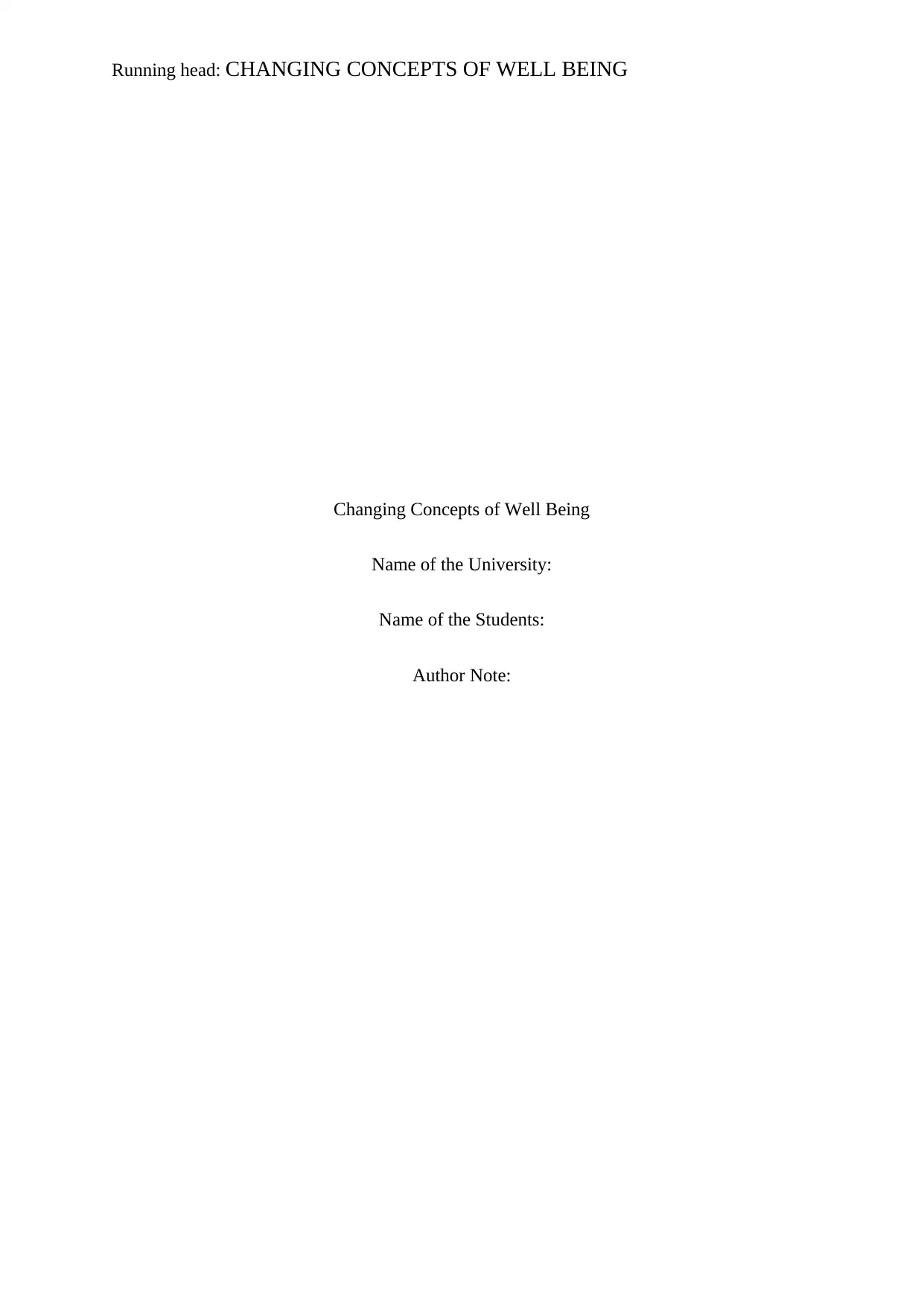
Running head: CHANGING CONCEPTS OF WELL BEING
Changing Concepts of Well Being
Name of the University:
Name of the Students:
Author Note:
Changing Concepts of Well Being
Name of the University:
Name of the Students:
Author Note:
Paraphrase This Document
Need a fresh take? Get an instant paraphrase of this document with our AI Paraphraser
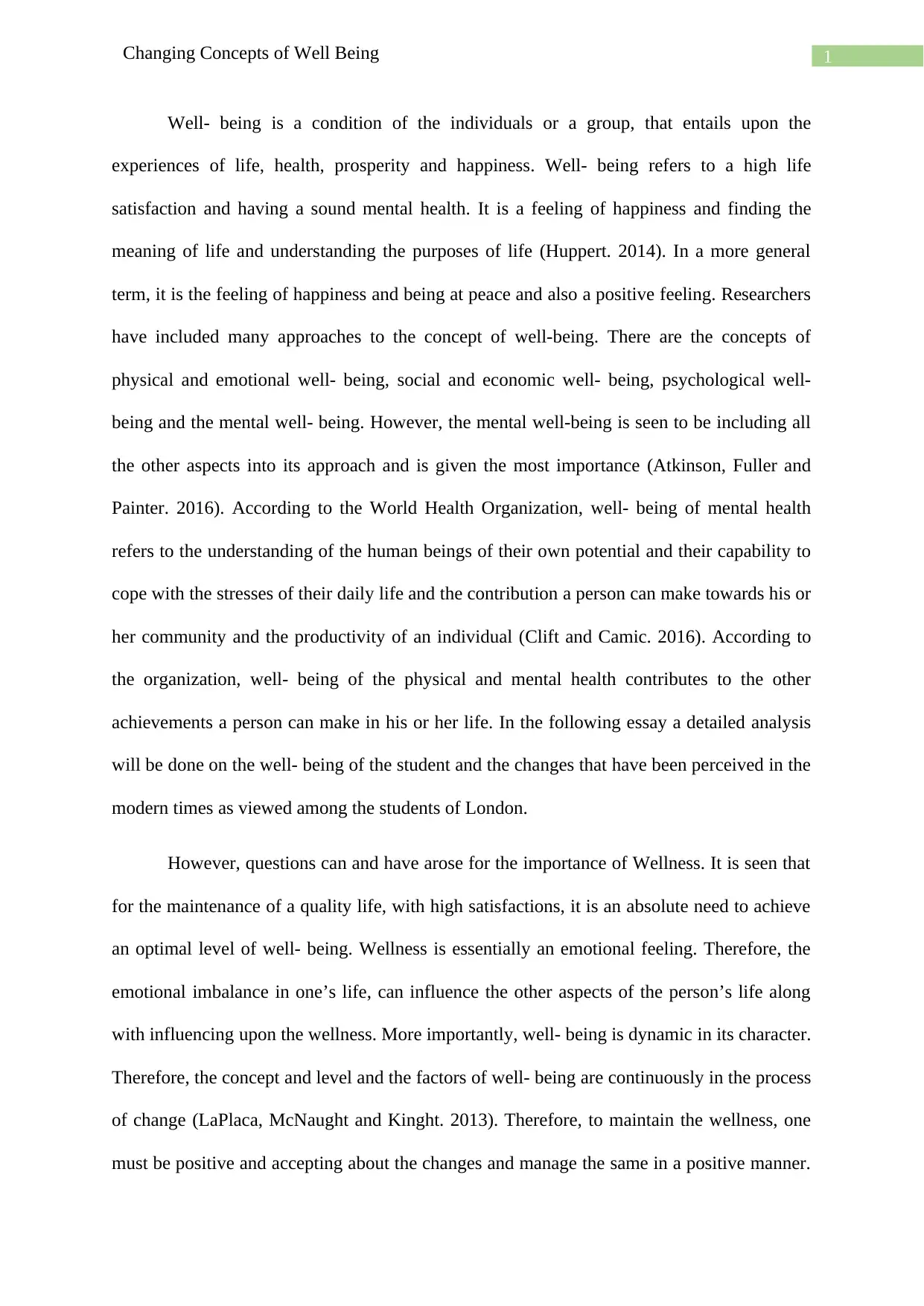
1Changing Concepts of Well Being
Well- being is a condition of the individuals or a group, that entails upon the
experiences of life, health, prosperity and happiness. Well- being refers to a high life
satisfaction and having a sound mental health. It is a feeling of happiness and finding the
meaning of life and understanding the purposes of life (Huppert. 2014). In a more general
term, it is the feeling of happiness and being at peace and also a positive feeling. Researchers
have included many approaches to the concept of well-being. There are the concepts of
physical and emotional well- being, social and economic well- being, psychological well-
being and the mental well- being. However, the mental well-being is seen to be including all
the other aspects into its approach and is given the most importance (Atkinson, Fuller and
Painter. 2016). According to the World Health Organization, well- being of mental health
refers to the understanding of the human beings of their own potential and their capability to
cope with the stresses of their daily life and the contribution a person can make towards his or
her community and the productivity of an individual (Clift and Camic. 2016). According to
the organization, well- being of the physical and mental health contributes to the other
achievements a person can make in his or her life. In the following essay a detailed analysis
will be done on the well- being of the student and the changes that have been perceived in the
modern times as viewed among the students of London.
However, questions can and have arose for the importance of Wellness. It is seen that
for the maintenance of a quality life, with high satisfactions, it is an absolute need to achieve
an optimal level of well- being. Wellness is essentially an emotional feeling. Therefore, the
emotional imbalance in one’s life, can influence the other aspects of the person’s life along
with influencing upon the wellness. More importantly, well- being is dynamic in its character.
Therefore, the concept and level and the factors of well- being are continuously in the process
of change (LaPlaca, McNaught and Kinght. 2013). Therefore, to maintain the wellness, one
must be positive and accepting about the changes and manage the same in a positive manner.
Well- being is a condition of the individuals or a group, that entails upon the
experiences of life, health, prosperity and happiness. Well- being refers to a high life
satisfaction and having a sound mental health. It is a feeling of happiness and finding the
meaning of life and understanding the purposes of life (Huppert. 2014). In a more general
term, it is the feeling of happiness and being at peace and also a positive feeling. Researchers
have included many approaches to the concept of well-being. There are the concepts of
physical and emotional well- being, social and economic well- being, psychological well-
being and the mental well- being. However, the mental well-being is seen to be including all
the other aspects into its approach and is given the most importance (Atkinson, Fuller and
Painter. 2016). According to the World Health Organization, well- being of mental health
refers to the understanding of the human beings of their own potential and their capability to
cope with the stresses of their daily life and the contribution a person can make towards his or
her community and the productivity of an individual (Clift and Camic. 2016). According to
the organization, well- being of the physical and mental health contributes to the other
achievements a person can make in his or her life. In the following essay a detailed analysis
will be done on the well- being of the student and the changes that have been perceived in the
modern times as viewed among the students of London.
However, questions can and have arose for the importance of Wellness. It is seen that
for the maintenance of a quality life, with high satisfactions, it is an absolute need to achieve
an optimal level of well- being. Wellness is essentially an emotional feeling. Therefore, the
emotional imbalance in one’s life, can influence the other aspects of the person’s life along
with influencing upon the wellness. More importantly, well- being is dynamic in its character.
Therefore, the concept and level and the factors of well- being are continuously in the process
of change (LaPlaca, McNaught and Kinght. 2013). Therefore, to maintain the wellness, one
must be positive and accepting about the changes and manage the same in a positive manner.
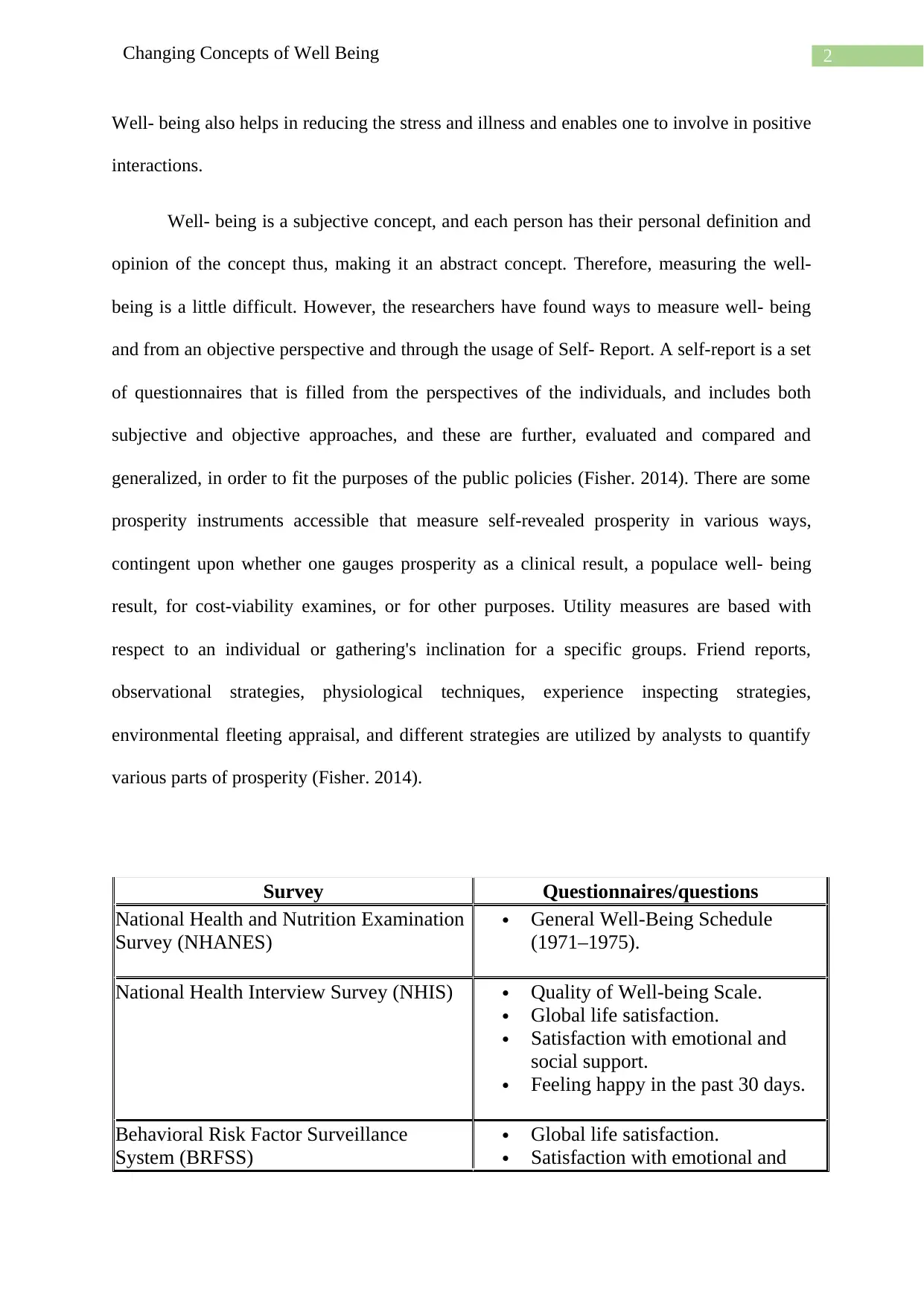
2Changing Concepts of Well Being
Well- being also helps in reducing the stress and illness and enables one to involve in positive
interactions.
Well- being is a subjective concept, and each person has their personal definition and
opinion of the concept thus, making it an abstract concept. Therefore, measuring the well-
being is a little difficult. However, the researchers have found ways to measure well- being
and from an objective perspective and through the usage of Self- Report. A self-report is a set
of questionnaires that is filled from the perspectives of the individuals, and includes both
subjective and objective approaches, and these are further, evaluated and compared and
generalized, in order to fit the purposes of the public policies (Fisher. 2014). There are some
prosperity instruments accessible that measure self-revealed prosperity in various ways,
contingent upon whether one gauges prosperity as a clinical result, a populace well- being
result, for cost-viability examines, or for other purposes. Utility measures are based with
respect to an individual or gathering's inclination for a specific groups. Friend reports,
observational strategies, physiological techniques, experience inspecting strategies,
environmental fleeting appraisal, and different strategies are utilized by analysts to quantify
various parts of prosperity (Fisher. 2014).
Survey Questionnaires/questions
National Health and Nutrition Examination
Survey (NHANES)
General Well-Being Schedule
(1971–1975).
National Health Interview Survey (NHIS) Quality of Well-being Scale.
Global life satisfaction.
Satisfaction with emotional and
social support.
Feeling happy in the past 30 days.
Behavioral Risk Factor Surveillance
System (BRFSS)
Global life satisfaction.
Satisfaction with emotional and
Well- being also helps in reducing the stress and illness and enables one to involve in positive
interactions.
Well- being is a subjective concept, and each person has their personal definition and
opinion of the concept thus, making it an abstract concept. Therefore, measuring the well-
being is a little difficult. However, the researchers have found ways to measure well- being
and from an objective perspective and through the usage of Self- Report. A self-report is a set
of questionnaires that is filled from the perspectives of the individuals, and includes both
subjective and objective approaches, and these are further, evaluated and compared and
generalized, in order to fit the purposes of the public policies (Fisher. 2014). There are some
prosperity instruments accessible that measure self-revealed prosperity in various ways,
contingent upon whether one gauges prosperity as a clinical result, a populace well- being
result, for cost-viability examines, or for other purposes. Utility measures are based with
respect to an individual or gathering's inclination for a specific groups. Friend reports,
observational strategies, physiological techniques, experience inspecting strategies,
environmental fleeting appraisal, and different strategies are utilized by analysts to quantify
various parts of prosperity (Fisher. 2014).
Survey Questionnaires/questions
National Health and Nutrition Examination
Survey (NHANES)
General Well-Being Schedule
(1971–1975).
National Health Interview Survey (NHIS) Quality of Well-being Scale.
Global life satisfaction.
Satisfaction with emotional and
social support.
Feeling happy in the past 30 days.
Behavioral Risk Factor Surveillance
System (BRFSS)
Global life satisfaction.
Satisfaction with emotional and
⊘ This is a preview!⊘
Do you want full access?
Subscribe today to unlock all pages.

Trusted by 1+ million students worldwide
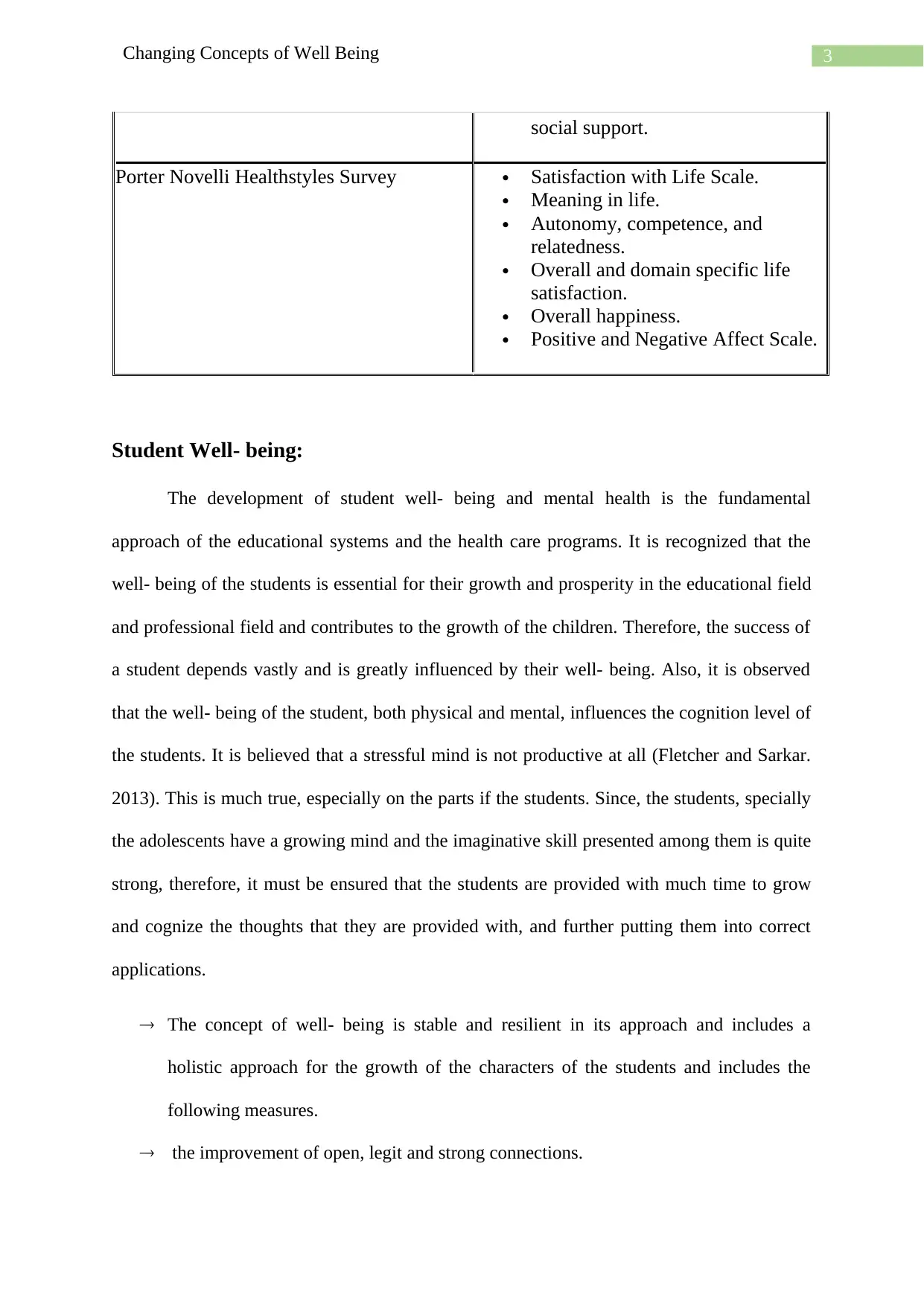
3Changing Concepts of Well Being
social support.
Porter Novelli Healthstyles Survey Satisfaction with Life Scale.
Meaning in life.
Autonomy, competence, and
relatedness.
Overall and domain specific life
satisfaction.
Overall happiness.
Positive and Negative Affect Scale.
Student Well- being:
The development of student well- being and mental health is the fundamental
approach of the educational systems and the health care programs. It is recognized that the
well- being of the students is essential for their growth and prosperity in the educational field
and professional field and contributes to the growth of the children. Therefore, the success of
a student depends vastly and is greatly influenced by their well- being. Also, it is observed
that the well- being of the student, both physical and mental, influences the cognition level of
the students. It is believed that a stressful mind is not productive at all (Fletcher and Sarkar.
2013). This is much true, especially on the parts if the students. Since, the students, specially
the adolescents have a growing mind and the imaginative skill presented among them is quite
strong, therefore, it must be ensured that the students are provided with much time to grow
and cognize the thoughts that they are provided with, and further putting them into correct
applications.
The concept of well- being is stable and resilient in its approach and includes a
holistic approach for the growth of the characters of the students and includes the
following measures.
the improvement of open, legit and strong connections.
social support.
Porter Novelli Healthstyles Survey Satisfaction with Life Scale.
Meaning in life.
Autonomy, competence, and
relatedness.
Overall and domain specific life
satisfaction.
Overall happiness.
Positive and Negative Affect Scale.
Student Well- being:
The development of student well- being and mental health is the fundamental
approach of the educational systems and the health care programs. It is recognized that the
well- being of the students is essential for their growth and prosperity in the educational field
and professional field and contributes to the growth of the children. Therefore, the success of
a student depends vastly and is greatly influenced by their well- being. Also, it is observed
that the well- being of the student, both physical and mental, influences the cognition level of
the students. It is believed that a stressful mind is not productive at all (Fletcher and Sarkar.
2013). This is much true, especially on the parts if the students. Since, the students, specially
the adolescents have a growing mind and the imaginative skill presented among them is quite
strong, therefore, it must be ensured that the students are provided with much time to grow
and cognize the thoughts that they are provided with, and further putting them into correct
applications.
The concept of well- being is stable and resilient in its approach and includes a
holistic approach for the growth of the characters of the students and includes the
following measures.
the improvement of open, legit and strong connections.
Paraphrase This Document
Need a fresh take? Get an instant paraphrase of this document with our AI Paraphraser
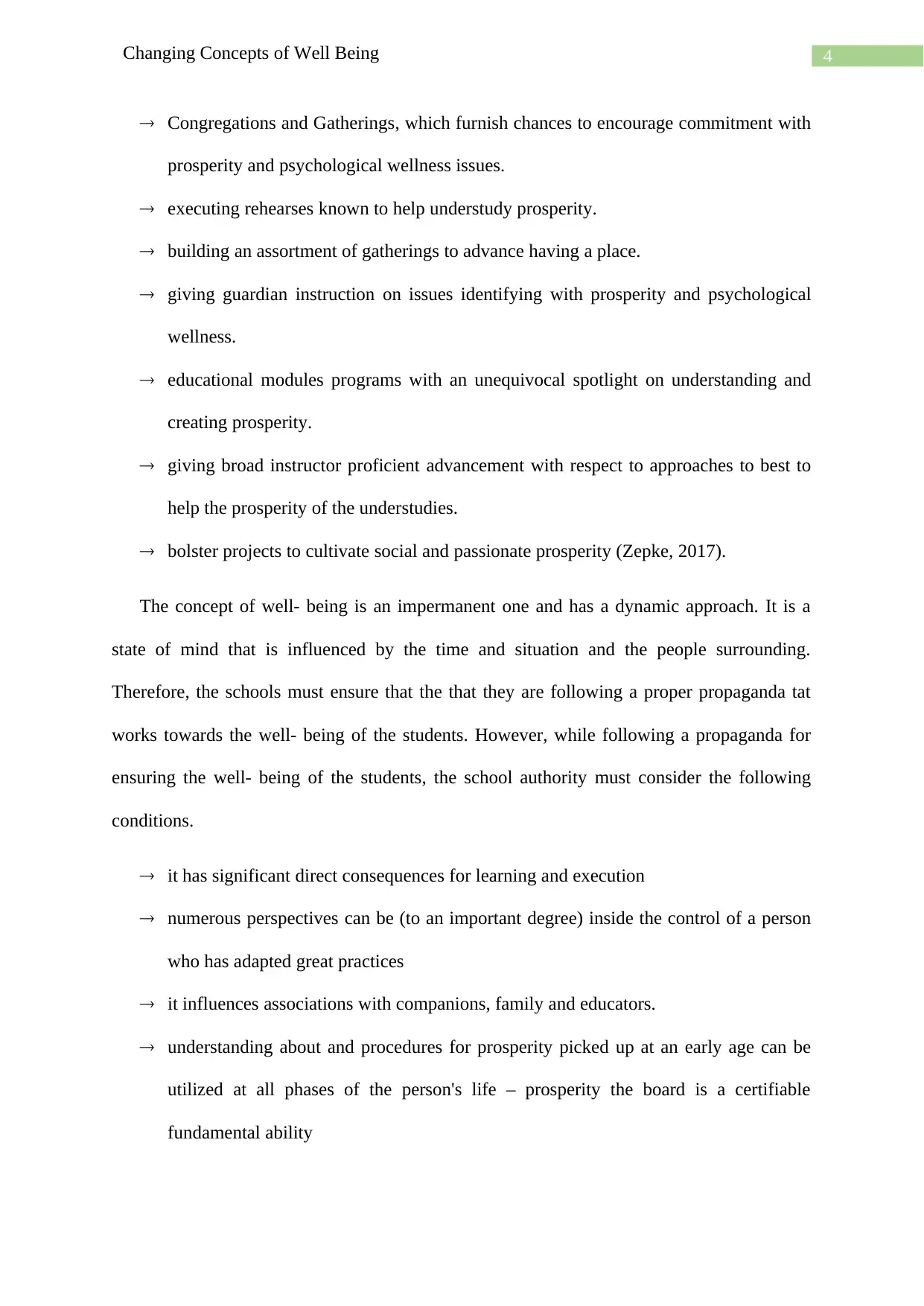
4Changing Concepts of Well Being
Congregations and Gatherings, which furnish chances to encourage commitment with
prosperity and psychological wellness issues.
executing rehearses known to help understudy prosperity.
building an assortment of gatherings to advance having a place.
giving guardian instruction on issues identifying with prosperity and psychological
wellness.
educational modules programs with an unequivocal spotlight on understanding and
creating prosperity.
giving broad instructor proficient advancement with respect to approaches to best to
help the prosperity of the understudies.
bolster projects to cultivate social and passionate prosperity (Zepke, 2017).
The concept of well- being is an impermanent one and has a dynamic approach. It is a
state of mind that is influenced by the time and situation and the people surrounding.
Therefore, the schools must ensure that the that they are following a proper propaganda tat
works towards the well- being of the students. However, while following a propaganda for
ensuring the well- being of the students, the school authority must consider the following
conditions.
it has significant direct consequences for learning and execution
numerous perspectives can be (to an important degree) inside the control of a person
who has adapted great practices
it influences associations with companions, family and educators.
understanding about and procedures for prosperity picked up at an early age can be
utilized at all phases of the person's life – prosperity the board is a certifiable
fundamental ability
Congregations and Gatherings, which furnish chances to encourage commitment with
prosperity and psychological wellness issues.
executing rehearses known to help understudy prosperity.
building an assortment of gatherings to advance having a place.
giving guardian instruction on issues identifying with prosperity and psychological
wellness.
educational modules programs with an unequivocal spotlight on understanding and
creating prosperity.
giving broad instructor proficient advancement with respect to approaches to best to
help the prosperity of the understudies.
bolster projects to cultivate social and passionate prosperity (Zepke, 2017).
The concept of well- being is an impermanent one and has a dynamic approach. It is a
state of mind that is influenced by the time and situation and the people surrounding.
Therefore, the schools must ensure that the that they are following a proper propaganda tat
works towards the well- being of the students. However, while following a propaganda for
ensuring the well- being of the students, the school authority must consider the following
conditions.
it has significant direct consequences for learning and execution
numerous perspectives can be (to an important degree) inside the control of a person
who has adapted great practices
it influences associations with companions, family and educators.
understanding about and procedures for prosperity picked up at an early age can be
utilized at all phases of the person's life – prosperity the board is a certifiable
fundamental ability
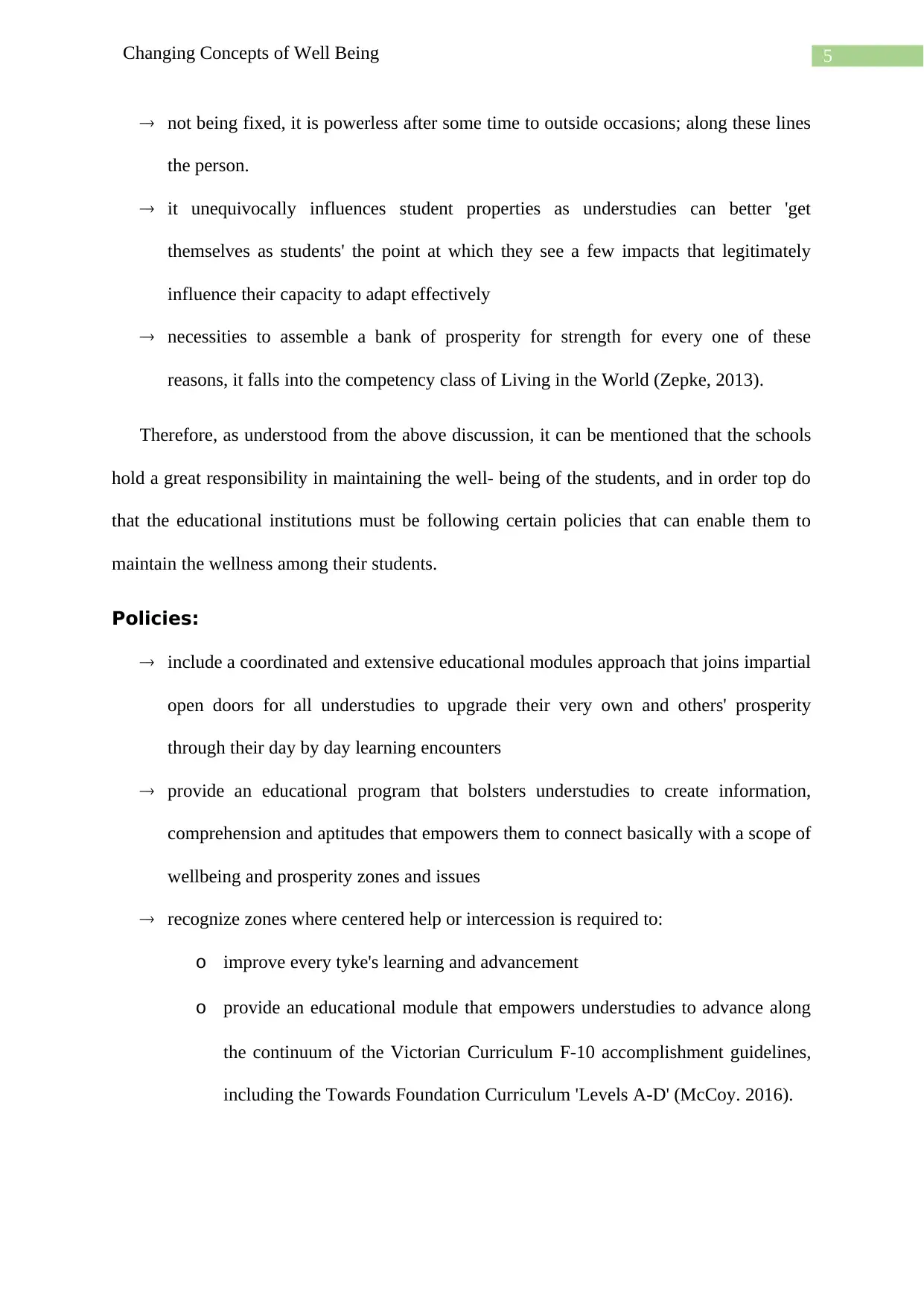
5Changing Concepts of Well Being
not being fixed, it is powerless after some time to outside occasions; along these lines
the person.
it unequivocally influences student properties as understudies can better 'get
themselves as students' the point at which they see a few impacts that legitimately
influence their capacity to adapt effectively
necessities to assemble a bank of prosperity for strength for every one of these
reasons, it falls into the competency class of Living in the World (Zepke, 2013).
Therefore, as understood from the above discussion, it can be mentioned that the schools
hold a great responsibility in maintaining the well- being of the students, and in order top do
that the educational institutions must be following certain policies that can enable them to
maintain the wellness among their students.
Policies:
include a coordinated and extensive educational modules approach that joins impartial
open doors for all understudies to upgrade their very own and others' prosperity
through their day by day learning encounters
provide an educational program that bolsters understudies to create information,
comprehension and aptitudes that empowers them to connect basically with a scope of
wellbeing and prosperity zones and issues
recognize zones where centered help or intercession is required to:
o improve every tyke's learning and advancement
o provide an educational module that empowers understudies to advance along
the continuum of the Victorian Curriculum F-10 accomplishment guidelines,
including the Towards Foundation Curriculum 'Levels A-D' (McCoy. 2016).
not being fixed, it is powerless after some time to outside occasions; along these lines
the person.
it unequivocally influences student properties as understudies can better 'get
themselves as students' the point at which they see a few impacts that legitimately
influence their capacity to adapt effectively
necessities to assemble a bank of prosperity for strength for every one of these
reasons, it falls into the competency class of Living in the World (Zepke, 2013).
Therefore, as understood from the above discussion, it can be mentioned that the schools
hold a great responsibility in maintaining the well- being of the students, and in order top do
that the educational institutions must be following certain policies that can enable them to
maintain the wellness among their students.
Policies:
include a coordinated and extensive educational modules approach that joins impartial
open doors for all understudies to upgrade their very own and others' prosperity
through their day by day learning encounters
provide an educational program that bolsters understudies to create information,
comprehension and aptitudes that empowers them to connect basically with a scope of
wellbeing and prosperity zones and issues
recognize zones where centered help or intercession is required to:
o improve every tyke's learning and advancement
o provide an educational module that empowers understudies to advance along
the continuum of the Victorian Curriculum F-10 accomplishment guidelines,
including the Towards Foundation Curriculum 'Levels A-D' (McCoy. 2016).
⊘ This is a preview!⊘
Do you want full access?
Subscribe today to unlock all pages.

Trusted by 1+ million students worldwide
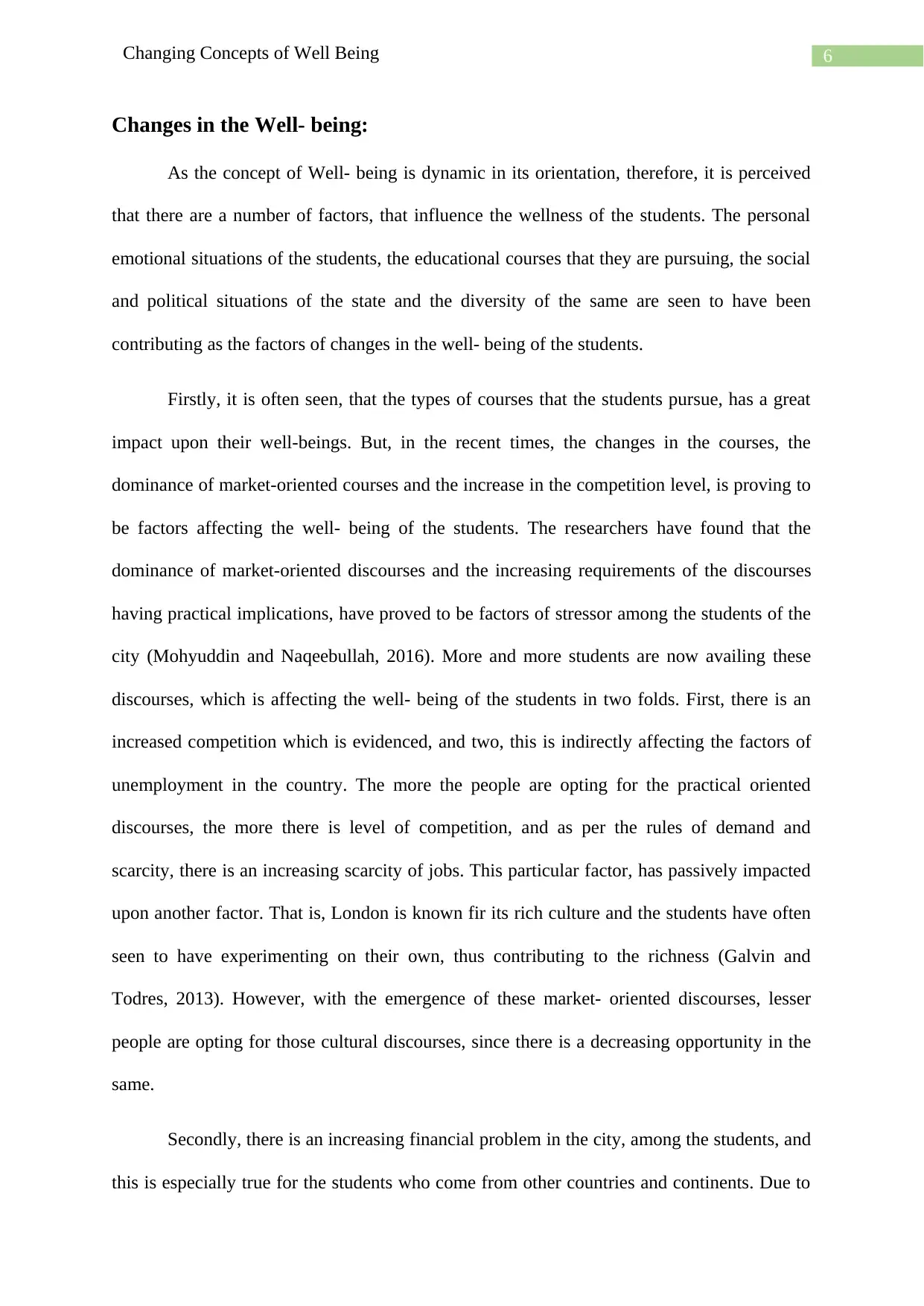
6Changing Concepts of Well Being
Changes in the Well- being:
As the concept of Well- being is dynamic in its orientation, therefore, it is perceived
that there are a number of factors, that influence the wellness of the students. The personal
emotional situations of the students, the educational courses that they are pursuing, the social
and political situations of the state and the diversity of the same are seen to have been
contributing as the factors of changes in the well- being of the students.
Firstly, it is often seen, that the types of courses that the students pursue, has a great
impact upon their well-beings. But, in the recent times, the changes in the courses, the
dominance of market-oriented courses and the increase in the competition level, is proving to
be factors affecting the well- being of the students. The researchers have found that the
dominance of market-oriented discourses and the increasing requirements of the discourses
having practical implications, have proved to be factors of stressor among the students of the
city (Mohyuddin and Naqeebullah, 2016). More and more students are now availing these
discourses, which is affecting the well- being of the students in two folds. First, there is an
increased competition which is evidenced, and two, this is indirectly affecting the factors of
unemployment in the country. The more the people are opting for the practical oriented
discourses, the more there is level of competition, and as per the rules of demand and
scarcity, there is an increasing scarcity of jobs. This particular factor, has passively impacted
upon another factor. That is, London is known fir its rich culture and the students have often
seen to have experimenting on their own, thus contributing to the richness (Galvin and
Todres, 2013). However, with the emergence of these market- oriented discourses, lesser
people are opting for those cultural discourses, since there is a decreasing opportunity in the
same.
Secondly, there is an increasing financial problem in the city, among the students, and
this is especially true for the students who come from other countries and continents. Due to
Changes in the Well- being:
As the concept of Well- being is dynamic in its orientation, therefore, it is perceived
that there are a number of factors, that influence the wellness of the students. The personal
emotional situations of the students, the educational courses that they are pursuing, the social
and political situations of the state and the diversity of the same are seen to have been
contributing as the factors of changes in the well- being of the students.
Firstly, it is often seen, that the types of courses that the students pursue, has a great
impact upon their well-beings. But, in the recent times, the changes in the courses, the
dominance of market-oriented courses and the increase in the competition level, is proving to
be factors affecting the well- being of the students. The researchers have found that the
dominance of market-oriented discourses and the increasing requirements of the discourses
having practical implications, have proved to be factors of stressor among the students of the
city (Mohyuddin and Naqeebullah, 2016). More and more students are now availing these
discourses, which is affecting the well- being of the students in two folds. First, there is an
increased competition which is evidenced, and two, this is indirectly affecting the factors of
unemployment in the country. The more the people are opting for the practical oriented
discourses, the more there is level of competition, and as per the rules of demand and
scarcity, there is an increasing scarcity of jobs. This particular factor, has passively impacted
upon another factor. That is, London is known fir its rich culture and the students have often
seen to have experimenting on their own, thus contributing to the richness (Galvin and
Todres, 2013). However, with the emergence of these market- oriented discourses, lesser
people are opting for those cultural discourses, since there is a decreasing opportunity in the
same.
Secondly, there is an increasing financial problem in the city, among the students, and
this is especially true for the students who come from other countries and continents. Due to
Paraphrase This Document
Need a fresh take? Get an instant paraphrase of this document with our AI Paraphraser
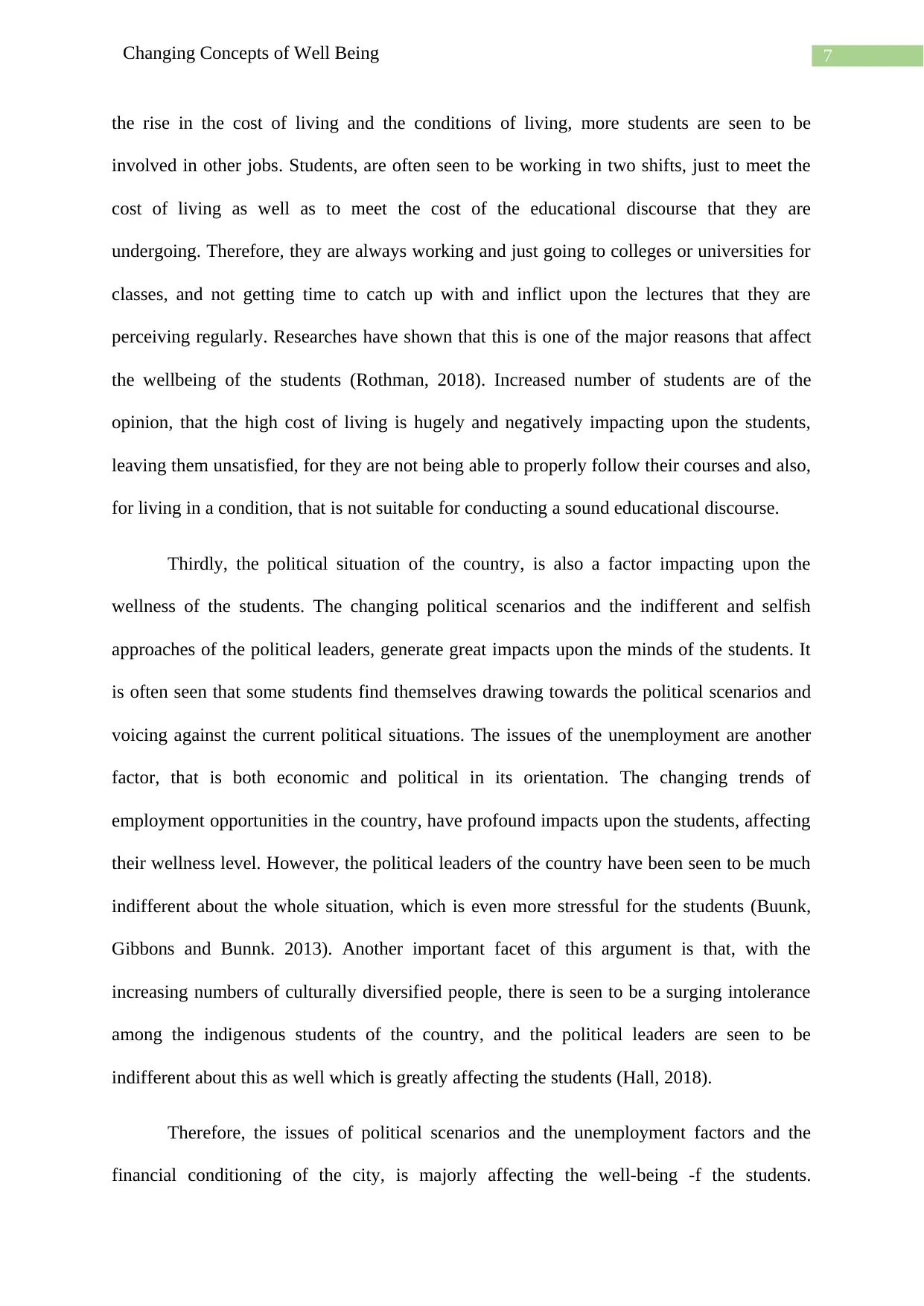
7Changing Concepts of Well Being
the rise in the cost of living and the conditions of living, more students are seen to be
involved in other jobs. Students, are often seen to be working in two shifts, just to meet the
cost of living as well as to meet the cost of the educational discourse that they are
undergoing. Therefore, they are always working and just going to colleges or universities for
classes, and not getting time to catch up with and inflict upon the lectures that they are
perceiving regularly. Researches have shown that this is one of the major reasons that affect
the wellbeing of the students (Rothman, 2018). Increased number of students are of the
opinion, that the high cost of living is hugely and negatively impacting upon the students,
leaving them unsatisfied, for they are not being able to properly follow their courses and also,
for living in a condition, that is not suitable for conducting a sound educational discourse.
Thirdly, the political situation of the country, is also a factor impacting upon the
wellness of the students. The changing political scenarios and the indifferent and selfish
approaches of the political leaders, generate great impacts upon the minds of the students. It
is often seen that some students find themselves drawing towards the political scenarios and
voicing against the current political situations. The issues of the unemployment are another
factor, that is both economic and political in its orientation. The changing trends of
employment opportunities in the country, have profound impacts upon the students, affecting
their wellness level. However, the political leaders of the country have been seen to be much
indifferent about the whole situation, which is even more stressful for the students (Buunk,
Gibbons and Bunnk. 2013). Another important facet of this argument is that, with the
increasing numbers of culturally diversified people, there is seen to be a surging intolerance
among the indigenous students of the country, and the political leaders are seen to be
indifferent about this as well which is greatly affecting the students (Hall, 2018).
Therefore, the issues of political scenarios and the unemployment factors and the
financial conditioning of the city, is majorly affecting the well-being -f the students.
the rise in the cost of living and the conditions of living, more students are seen to be
involved in other jobs. Students, are often seen to be working in two shifts, just to meet the
cost of living as well as to meet the cost of the educational discourse that they are
undergoing. Therefore, they are always working and just going to colleges or universities for
classes, and not getting time to catch up with and inflict upon the lectures that they are
perceiving regularly. Researches have shown that this is one of the major reasons that affect
the wellbeing of the students (Rothman, 2018). Increased number of students are of the
opinion, that the high cost of living is hugely and negatively impacting upon the students,
leaving them unsatisfied, for they are not being able to properly follow their courses and also,
for living in a condition, that is not suitable for conducting a sound educational discourse.
Thirdly, the political situation of the country, is also a factor impacting upon the
wellness of the students. The changing political scenarios and the indifferent and selfish
approaches of the political leaders, generate great impacts upon the minds of the students. It
is often seen that some students find themselves drawing towards the political scenarios and
voicing against the current political situations. The issues of the unemployment are another
factor, that is both economic and political in its orientation. The changing trends of
employment opportunities in the country, have profound impacts upon the students, affecting
their wellness level. However, the political leaders of the country have been seen to be much
indifferent about the whole situation, which is even more stressful for the students (Buunk,
Gibbons and Bunnk. 2013). Another important facet of this argument is that, with the
increasing numbers of culturally diversified people, there is seen to be a surging intolerance
among the indigenous students of the country, and the political leaders are seen to be
indifferent about this as well which is greatly affecting the students (Hall, 2018).
Therefore, the issues of political scenarios and the unemployment factors and the
financial conditioning of the city, is majorly affecting the well-being -f the students.
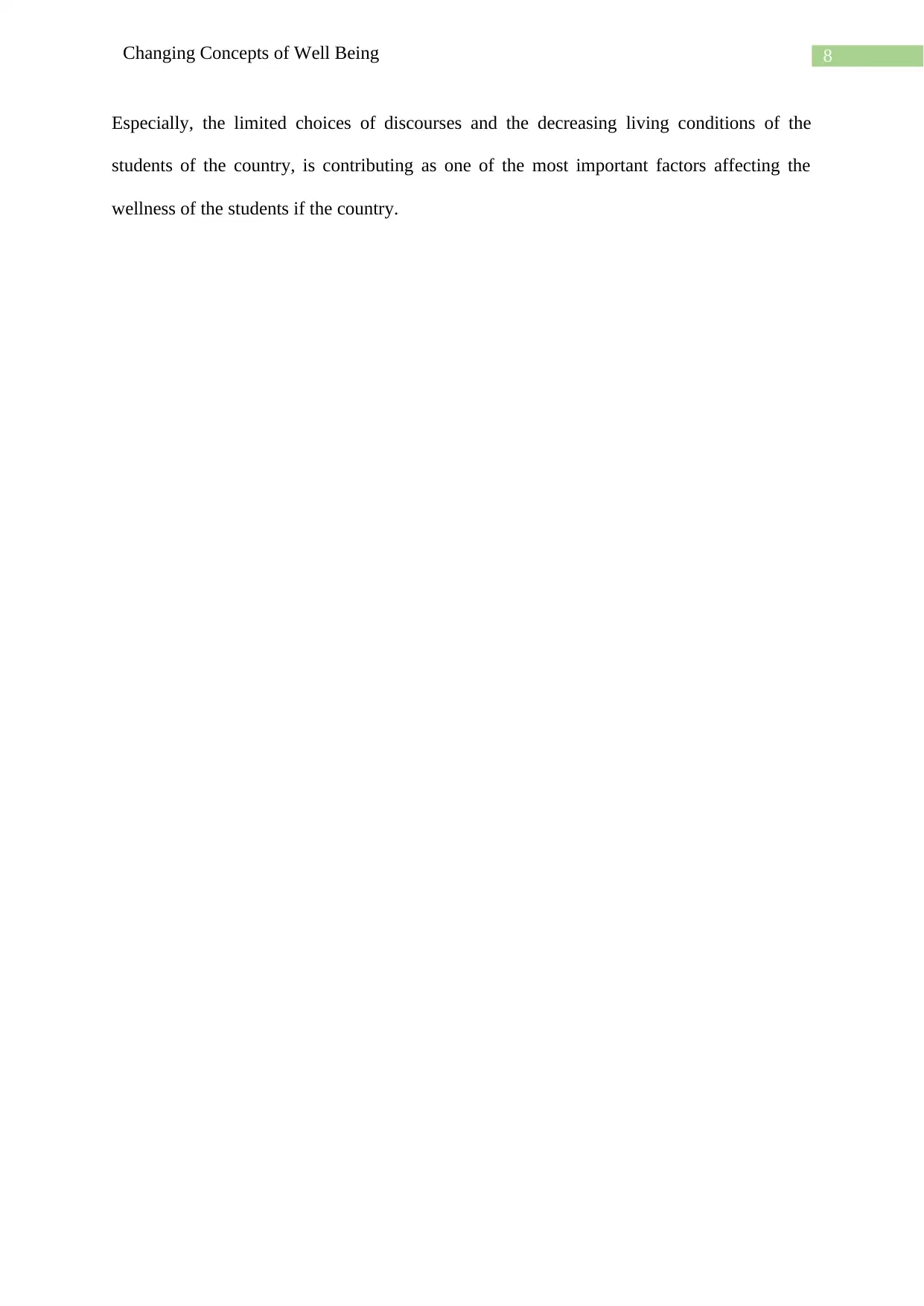
8Changing Concepts of Well Being
Especially, the limited choices of discourses and the decreasing living conditions of the
students of the country, is contributing as one of the most important factors affecting the
wellness of the students if the country.
Especially, the limited choices of discourses and the decreasing living conditions of the
students of the country, is contributing as one of the most important factors affecting the
wellness of the students if the country.
⊘ This is a preview!⊘
Do you want full access?
Subscribe today to unlock all pages.

Trusted by 1+ million students worldwide
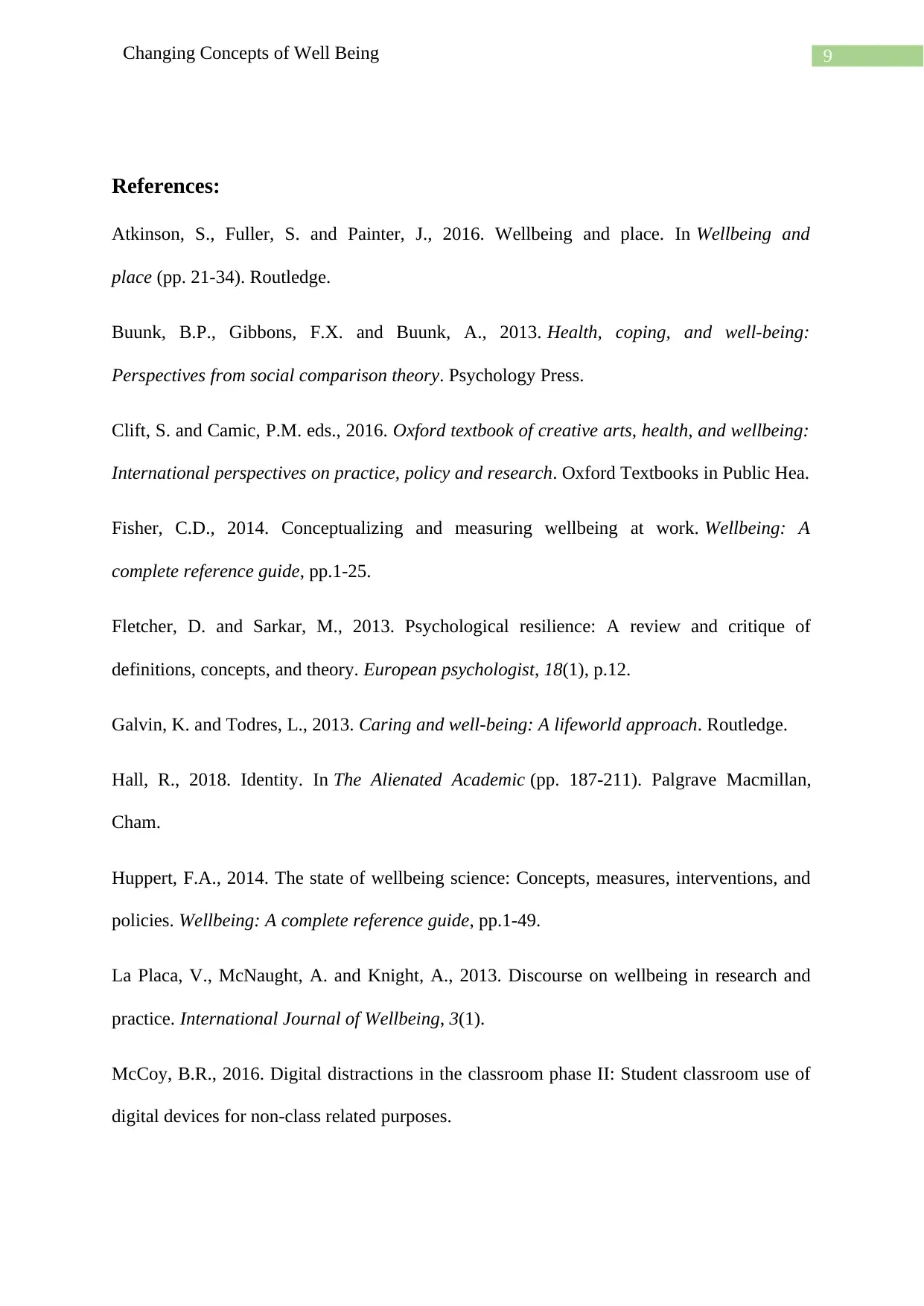
9Changing Concepts of Well Being
References:
Atkinson, S., Fuller, S. and Painter, J., 2016. Wellbeing and place. In Wellbeing and
place (pp. 21-34). Routledge.
Buunk, B.P., Gibbons, F.X. and Buunk, A., 2013. Health, coping, and well-being:
Perspectives from social comparison theory. Psychology Press.
Clift, S. and Camic, P.M. eds., 2016. Oxford textbook of creative arts, health, and wellbeing:
International perspectives on practice, policy and research. Oxford Textbooks in Public Hea.
Fisher, C.D., 2014. Conceptualizing and measuring wellbeing at work. Wellbeing: A
complete reference guide, pp.1-25.
Fletcher, D. and Sarkar, M., 2013. Psychological resilience: A review and critique of
definitions, concepts, and theory. European psychologist, 18(1), p.12.
Galvin, K. and Todres, L., 2013. Caring and well-being: A lifeworld approach. Routledge.
Hall, R., 2018. Identity. In The Alienated Academic (pp. 187-211). Palgrave Macmillan,
Cham.
Huppert, F.A., 2014. The state of wellbeing science: Concepts, measures, interventions, and
policies. Wellbeing: A complete reference guide, pp.1-49.
La Placa, V., McNaught, A. and Knight, A., 2013. Discourse on wellbeing in research and
practice. International Journal of Wellbeing, 3(1).
McCoy, B.R., 2016. Digital distractions in the classroom phase II: Student classroom use of
digital devices for non-class related purposes.
References:
Atkinson, S., Fuller, S. and Painter, J., 2016. Wellbeing and place. In Wellbeing and
place (pp. 21-34). Routledge.
Buunk, B.P., Gibbons, F.X. and Buunk, A., 2013. Health, coping, and well-being:
Perspectives from social comparison theory. Psychology Press.
Clift, S. and Camic, P.M. eds., 2016. Oxford textbook of creative arts, health, and wellbeing:
International perspectives on practice, policy and research. Oxford Textbooks in Public Hea.
Fisher, C.D., 2014. Conceptualizing and measuring wellbeing at work. Wellbeing: A
complete reference guide, pp.1-25.
Fletcher, D. and Sarkar, M., 2013. Psychological resilience: A review and critique of
definitions, concepts, and theory. European psychologist, 18(1), p.12.
Galvin, K. and Todres, L., 2013. Caring and well-being: A lifeworld approach. Routledge.
Hall, R., 2018. Identity. In The Alienated Academic (pp. 187-211). Palgrave Macmillan,
Cham.
Huppert, F.A., 2014. The state of wellbeing science: Concepts, measures, interventions, and
policies. Wellbeing: A complete reference guide, pp.1-49.
La Placa, V., McNaught, A. and Knight, A., 2013. Discourse on wellbeing in research and
practice. International Journal of Wellbeing, 3(1).
McCoy, B.R., 2016. Digital distractions in the classroom phase II: Student classroom use of
digital devices for non-class related purposes.
Paraphrase This Document
Need a fresh take? Get an instant paraphrase of this document with our AI Paraphraser
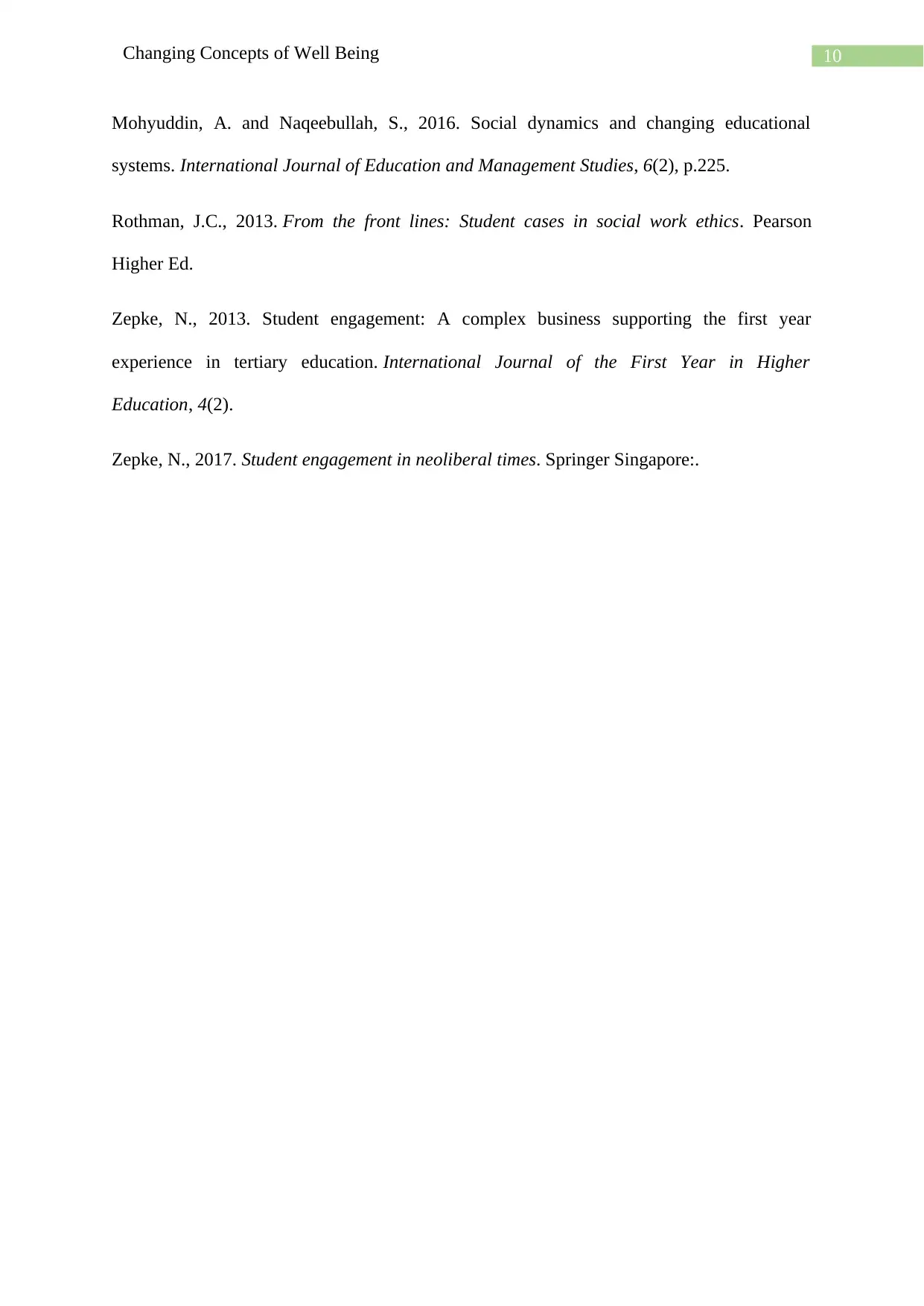
10Changing Concepts of Well Being
Mohyuddin, A. and Naqeebullah, S., 2016. Social dynamics and changing educational
systems. International Journal of Education and Management Studies, 6(2), p.225.
Rothman, J.C., 2013. From the front lines: Student cases in social work ethics. Pearson
Higher Ed.
Zepke, N., 2013. Student engagement: A complex business supporting the first year
experience in tertiary education. International Journal of the First Year in Higher
Education, 4(2).
Zepke, N., 2017. Student engagement in neoliberal times. Springer Singapore:.
Mohyuddin, A. and Naqeebullah, S., 2016. Social dynamics and changing educational
systems. International Journal of Education and Management Studies, 6(2), p.225.
Rothman, J.C., 2013. From the front lines: Student cases in social work ethics. Pearson
Higher Ed.
Zepke, N., 2013. Student engagement: A complex business supporting the first year
experience in tertiary education. International Journal of the First Year in Higher
Education, 4(2).
Zepke, N., 2017. Student engagement in neoliberal times. Springer Singapore:.
1 out of 11
Related Documents
Your All-in-One AI-Powered Toolkit for Academic Success.
+13062052269
info@desklib.com
Available 24*7 on WhatsApp / Email
![[object Object]](/_next/static/media/star-bottom.7253800d.svg)
Unlock your academic potential
Copyright © 2020–2026 A2Z Services. All Rights Reserved. Developed and managed by ZUCOL.





